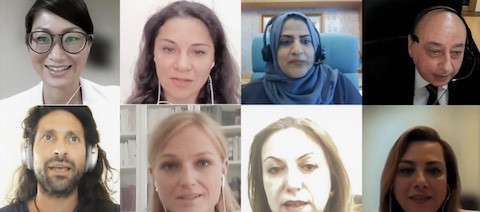The UNESCO Regional Bureau for Education in the Arab States held on June 9, 2021, the Arab Regional Technical Meeting on Education for Sustainable Development (ESD) for 2030 as a virtual event, building on the UNESCO World Conference on ESD held on 17-19 May 2021. This regional event welcomed more than 370 participants from the region and all over the world. Experts from UNESCO and the Ban Ki-Moon Center, governmental officials from Lebanon, Jordan, Oman and Syria, and youth representatives from Organisation De Developpement Durable (ODDD) brought up informative and insightful discussions on leveraging ESD for the 2030 framework in the Arab Region.
The meeting, moderated by Mona Zoghbi from UNESCO, provided a timely platform for participants to discuss region-specific needs and approaches for ESD for 2030; and for representatives of Ministries of Education or of the National Commissions of UNESCO in the countries of Lebanon, Oman, Jordan and Syria to introduce their country initiatives of ESD for 2030 in order to leverage ESD at the national level and to discuss the way-forward actions with UNESCO.
According to the discussions, Lebanon is currently drafting inclusive plans towards sustainable development in general and ESD in particular. Jordan has focused on ensuring its policy, environmental and institutional frameworks are conducive to the commencement of the 2030 Agenda’s robust implementation, building on achievements and successful mechanisms. Oman has also started its pursuit of ESD by establishing a national working group to focus on the five priority action areas in alignment with the “Oman Vision 2040”, which aims at achieving quality education systems, computerizing schools, building educators’ capacities, activating the role of youth, and building partnerships with local communities. The Syrian Arab Republic is also working on introducing new concepts on sustainable development into the curriculum.
In addition, Ms. Monika Froehler from the Ban Ki-moon Centre for Global Citizens was invited to share the vision and approach of the Centre with regards to education, and to provide policy recommendations to the national education authorities in the Arab region on ESD. Ms. Froehler pointed out that ESD for 2030 provides an opportunity for various stakeholders to work together, pushing forward the changing potential brought by education. On his part, Mr. Eliesh Sahyoun from ODDD highlighted the importance of empowering young people to meaningfully contribute to the discussions, decisions and actions on ESD at both national and regional levels. Finally, Mr. Salim Shehadeh from UNESCO introduced the way-forward and the prospective actions regarding the ESD for 2030 and emphasized the long-term technical support from UNESCO.
UNESCO will be continuously collaborating with the national authorities in these Arab countries on developing their national ESD initiatives.
ESD leads a powerful change in the education system beginning from schools and stretching to lifelong learning and non-formal education, and it is at the core to reimagine education and the foundation for the required transformation. Realizing the potential brought by the ESD requires national commitment and multi-stakeholder partnership for more effective and creative action.


